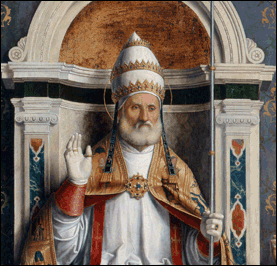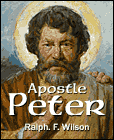Free E-Mail
Bible Studies
Beginning the Journey (for new Christians). en Español
Old Testament
Abraham
Jacob
Moses
Joshua
Gideon
David, Life of
Elijah
Psalms
Solomon
Songs of Ascent (Ps 120-135)
Isaiah
Advent/Messianic Scriptures
Daniel
Rebuild & Renew: Post-Exilic Books
Gospels
Christmas Incarnation
(Mt, Lk)
Sermon on the Mount
(Mt 5-7)
Mark
Luke's
Gospel
John's Gospel
7 Last Words of Christ
Parables
Jesus and the Kingdom
Resurrection
Apostle Peter
Acts
The Early Church
(Acts 1-12)
Apostle Paul
(Acts 12-28)
Paul's Epistles
Christ Powered Life (Rom 5-8)
1 Corinthians
2 Corinthians
Galatians
Ephesians
Vision for Church
(Eph)
Philippians
Colossians,
Philemon
1
& 2 Thessalonians
1 & 2 Timothy,
Titus
General Epistles
Hebrews
James
1 Peter
2 Peter, Jude
1, 2, and 3 John
Revelation
Revelation
Conquering Lamb of Revelation
Topical
Glorious Kingdom, The
Grace
Great Prayers
Holy Spirit, Disciple's Guide
Humility
Lamb of God
Listening for God's Voice
Lord's Supper
Names of God
Names of Jesus
Christian Art
About Us
Podcasts
Contact Us
Dr. Wilson's Books
Donations
Watercolors
Sitemap
 The Roman Catholic Church sees Peter as the first pope. This understanding is visualized by Italian painter Giovanni Battista Cima, in a detail of 'St. Peter Enthroned with St. John the Baptist and Paul' (1515-16), oil on panel, 155x146 cm, Pinacoteca di Brera, Milan, Italy. |
Sometimes the primacy of Peter gets confused with papal primacy, the primacy of the Roman bishop. If we are not careful this confusion can affect how we interpret Scriptures that indicate Peter as the leader of the disciples. Let's begin by examining the development of the papacy in Rome.
From Elders to a Monarchical Episcopacy
The New Testament seems to use the terms elder/presbyter = pastor/shepherd = overseer/bishop synonymously.456 However, by the early second century, in the letters of Ignatius, Bishop of Antioch (d. about 110 AD), we begin to see the development of a hierarchical structure with bishops, who have authority over priests/presbyters and deacons serving in their city or diocese (administrative district). By the end of the second century, the bishop over others was the norm, known as a "monarchical episcopacy."
Father, Pope, and Pontiff
The church began to use the title "Father" for the head of a monastery, then to refer to monastic priests, and eventually by the mid-nineteenth century to all clergy in many Catholic, Anglican, and Eastern traditions. "Father" is a functional title, as one who is in charge of a family and cares for it.
In the early centuries of the church, bishops, especially in the East, were referred to as "father" (from Greek pappas). From the reign of Pope Leo I (440-461) forward, the term was reserved in the West to refer to the Bishop of Rome.457
Another word related to the papacy is "pontiff." The word comes from the ancient Roman colleges of priests, the leader of which was termed the potifix maximus. The Latin Vulgate Bible translates "chief priest" as pontifex. In the Roman Catholic church, "pontiff" can be used of any bishop, but is used especially of the pope.
Gradual Ascendancy of Roman Influence
In the first century, the Roman bishop was important as the leader of the church in the Roman capital. Gradually, the prominence and influence of the Roman bishop increased, so that he began to take action over heresies in other areas. The First Council of Nicaea (325 AD) recognized the special role of the Sees of Rome, Alexandria, and Antioch. Gradually, the patriarch of Constantinople (present-day Istanbul), capital of the Eastern Roman Empire, and the bishop of Rome each consolidated power. After the fall of Rome, the pope remained as a source of authority and continuity. In 1054 AD, the Eastern and Western arms of the Church split. Rome controlled the Western Church, which became known as the Catholic Church, while Constantinople controlled the Eastern Church, which became what we call the Orthodox Church in our day.
My point in this brief and selective historical review is that the Roman bishop was not instantly accepted as the leader of the Church. That took centuries to develop.
Peter's Primacy and Roman Primacy
What does all this have to do with Peter?
We saw in Lesson 3.2.2, after Peter's confession at Caesarea Philippi, Jesus clearly calls out Peter as the leader of the apostles.
"18 I tell you that you are Peter, and on this rock I will build my church, and the gates of Hades will not overcome it. 19 I will give you the keys of the kingdom of heaven; whatever you bind on earth will be bound in heaven, and whatever you loose on earth will be loosed in heaven." (Matthew 16:18--19)
Gradually, the Bishop of Rome claimed authority over other bishops based on the claim that he was the successor to Peter -- and Peter's primacy. There are several steps in this logic.
Founder. Peter and Paul are claimed by early church writers as the "founders" of the church at Rome. I'll accept that, if you mean by "founder" a person early in the church's development that helped organize and expand the Roman Church. Peter did that; so did Paul. As we saw in Lesson 11.3, each of them is said to have ordained future bishops of the Roman church.
First bishop. I don't believe that the earliest writers see Peter so much as a bishop as the lead apostle. He probably set in place pastors and deacons and, for a time, was recognized as leader of the Roman church. Peter's main role in Rome seems to be preaching, teaching, prayer, evangelism, miracles, and confronting heresy, rather than administrative functions. Was he the first bishop? Not technically.
 Available in book versions: paperback, PDF, and Kindle |
Successors. Both Peter and Paul ordained men as bishops who would eventually lead the Roman church. These bishops succeeded Peter as leader of the Roman church, yes. But I think it is difficult to argue that upon being set in office they automatically became the rock of the Universal Church and holder of the Keys to the Kingdom of God. Those were uniquely given to Peter; nowhere in Scripture do we see these as being passed on to a successor. This is different from the idea of "apostolic succession."458
Peter has a unique, personal role in establishing the early Church. His gifts and calling are not passed on by the laying on of hands, though the Spirit uses the laying on of hands to impart His gifts and to ordain leaders.
This may sound crazy. And I ask my Roman Catholic brothers and sisters to bear with me here. But I think some evangelicals are afraid to acknowledge Peter's primacy for fear of sounding too Catholic. Fear not, my friends. Peter's primacy is different from the primacy of the pope. So don't be afraid to interpret the promises to Peter in Matthew 16:16-17 boldly as Jesus intended us to. Peter's primacy was for his remarkable role during his lifetime. Jesus' primacy is forever!
End Notes
[456] 1 Peter 5:1-2; 1 Timothy 3:1; Titus 1:5.
[457] Wikipedia article, "Pope."
[458] Apostolic succession is the belief that authority and legitimacy of ordination to ministry is passed down from the hands of a bishop, who is ordained by a bishop in direct succession from one of the original apostles. This belief is held by Roman Catholic, Anglican, Eastern Orthodox traditions, and some others. See Wikipedia article, "Apostolic Succession."
Copyright © 2025, Ralph F. Wilson. <pastor![]() joyfulheart.com> All rights reserved. A single copy of this article is free. Do not put this on a website. See legal, copyright, and reprint information.
joyfulheart.com> All rights reserved. A single copy of this article is free. Do not put this on a website. See legal, copyright, and reprint information.

|

|
In-depth Bible study books
You can purchase one of Dr. Wilson's complete Bible studies in PDF, Kindle, or paperback format -- currently 48 books in the JesusWalk Bible Study Series.
Old Testament- Abraham, Faith of
- Jacob, Life of
- Moses the Reluctant Leader
- Joshua
- Gideon
- David, Life of
- Elijah
- Psalms
- Solomon
- Songs of Ascent (Psalms 120-134)
- Isaiah
- 28 Advent Scriptures (Messianic)
- Daniel
- Rebuild & Renew: Post-Exilic Books
Gospels
- Christmas Incarnation (Mt, Lk)
- Sermon on the Mount (Mt 5-7)
- Luke's Gospel
- John's Gospel
- Seven Last Words of Christ
- Parables
- Jesus and the Kingdom of God
- Resurrection and Easter Faith
- Apostle Peter
Acts
Pauline Epistles
- Romans 5-8 (Christ-Powered Life)
- 1 Corinthians
- 2 Corinthians
- Galatians
- Ephesians
- Philippians
- Colossians, Philemon
- 1 & 2 Thessalonians
- 1 &2 Timothy, Titus
General Epistles
Revelation
Topical
